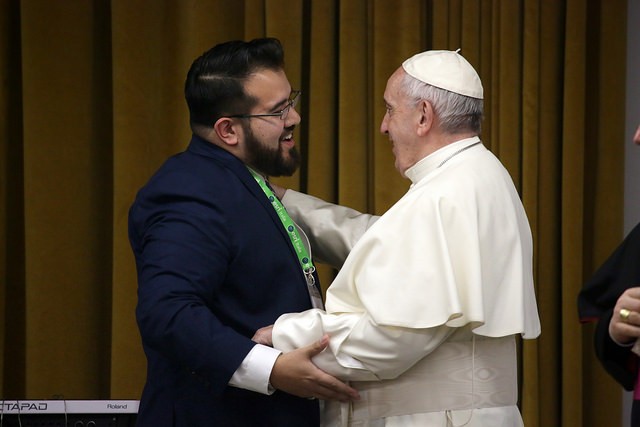Nick López. Presentation on the Youth in the Americas

I.
Buenos Días, Santo Padre, Obispos, Hermanos (y Hermanas), agradezco la oportunidad de hablarles esta mañana. Mi nombre es Nicolas Lopez, Vengo de las ciudades de Dallas y San Antonio, Texas en los Estados Unidos de Norteamérica. Como no hablo mucho Español, quize empezar a hacerlo hoy, como un pequeño gesto de respeto y unidad a nombre de los Estados Unidos de Norteamérica. Porque ahora mas que nunca es importante que mostremos nuestra solidaridad y unidad con Ustedes, nuestros Hermanos (y Hermanas) de cada Nación de Latino América. En consecuencia, hoy los saludo con amor sincero.
TRANSLATION [Good Morning, Holy Father, bishops, my brothers and sisters, I thank you all for the opportunity to speak this morning. My name is Nicholas López, and I come from the cities of Dallas and San Antonio, Texas in the United States. While I do not speak much Spanish, I wanted to begin in Spanish today, as a small gesture of respect and unity on behalf of the United States. Now more than ever, it is important that we show our solidarity and unity with you, our brothers and sisters of every nation of Latin America. So, it is with sincere love that I greet you today.]
And it is with that same love that I greet all of you today - delegates from all over the world. What a beautiful sign of our church here in this room. People of different cultures, traditions, and languages, each with our own unique experiences, gathered today for something we all share in common: the love and concern for the young people of the Church.
Today I have been asked to represent the Americas, and the experiences of young people from our continent. I cannot hope to touch on every point that affects the lives of the people of our complex and beautiful continent, so I ask for pardon from my fellow delegates if certain matters are not addressed.
This upcoming synod is entitled, “young people, the faith, and vocational discernment.” I would now like to make brief comments about all 3 of these sections, first by saying a little bit about the life of the young person, then how we see faith, and conclude with our experiences with vocational discernment.
II.
In my 5 years as a young adult and college campus minister I have found that if there is one overall theme that highlights the life of a young person, it is transition. Moving, choosing, experimenting, failing, succeeding, fearing, and hoping that that next steps we make are the steps that God is calling us to make. Some of these transitions include entering high school, receiving the sacrament of Confirmation, going off to college, going abroad to be a missionary, moving out of your parent’s home, getting your first job or getting a job after college, getting married, having children, or entering the seminary or convent. The life of the young person is riddled with potential changes. The mere existence of these options is cause for great anxiety or stress in the hearts of our young people. Anxiety often arises from not transitioning into these areas as quickly as society, or our families expect us to – if we ever transition into them at all; and even those who make such important decisions find themselves worried that they’ve made the wrong choices.
I myself have struggled with many of these anxieties, but through the grace of the Almighty, and the support of a loving and faithful mother, I stand here today, comfortable with my career and feel content with my choices. Yet I know I am still in the process of transitioning, and yes it still does make me quite anxious. I’m still “trying to find my place in this world,” discerning where God wants me next, discerning if my wildest dreams could still possibly be accomplished, discerning marriage to a beautiful woman, and the list goes on. So, I stand here today not as an example for young people on how to do things exactly right, but very much an example of the young person this upcoming synod will support. I am still in much need of the Church’s guidance and I thank you Holy Father for taking the initiative to hear us.
III.
Indeed, it appears that Church’s guidance of our youth is needed now more than ever. Unfortunately, research shows that about half our young people mistrust religious leaders and are skeptical about religion in general. Even currently in the United States, about one-third of our young people do not affiliate with any religion at all; and even of our young adult Catholics, less than 15% percent attend Mass every week. Furthermore, most recent research shows that our youth have begun to distance themselves from the faith from as early as 11 to 13 years old.
There is some good news, however. About 40% of young people in the U.S. still attend Ash Wednesday services and about just as many participate in Lenten observances, showing that they still find the season of penance and preparation relevant to their lives. Indeed, Catholicism’s relevance to young people today is displayed during each international World Youth Day gathering, where millions of young people give testament to the vibrancy of the young Church. We were blessed in the Americas to have hosted World Youth Day in Brazil in 2013, and we are excited to once again host it this upcoming year in Panama.
When it comes to faith, we acknowledge that while many of our youth might not believe as strongly in religion any more, they do appear to have faith in one another. Through the advancements of the internet, digital technology, and social media, our young people are now able speak their concerns and hopes to the world. And in their words, we see a generation of thoughtful and connected people, who seek to stand up for one another, regardless of differences in faith or nation. This spirit of activism exists among Catholic youth, inspiring them to advocate for the unborn through pro-life movements, as well as other causes. Admittedly, certain convictions for which our young people advocate conflict with Christian values, and indicate that many of our youth appear to be lost in a world of moral relativism. However, their zeal, though at times misguided, is a noble characteristic of our young people, and we cannot deny their passion, nor their seeking. They are looking for something true and fulfilling to live for. We must show them that what (and more importantly, who) they are seeking is Christ.
IV.
Indeed, our young people’s dreams of going out and changing the world seem as alive as ever. But how exactly to go out and change the world is their question.
So where do our young people today stand on discerning their vocations?
When it comes to marriage, many of our youth are exposed to high divorce rates among their parents; and many young couples themselves, some only married for only a couple of years or less, are themselves divorcing. Signs point to a large amount of our young people today eventually having multiple marriages in their lifetimes, if they are to marry at all. Many now choose to skip marriage altogether, as cohabitation outside the bonds of marriage is quickly becoming the norm.
But even in these challenging times, I can attest, as perhaps many in this room can, that there still are many beautiful witnesses to loving and faithful marriage. And we thank you for that witness and pray for you. Even vocations to the Priesthood, religious or consecrated life, while overall still not as high as they used to be generations ago, are also very much alive today. Despite pressures from an increasingly oppressive secular society, and even fear of violent persecution, young people in the Americas are still answering God’s call to enter formation.
However, there are many obstacles our young people face today that keep them from fully answering the Lord’s call. For some it is their hearts that have yet to be softened to hear God’s voice. For others they believe the Church is to blame, feeling that there is more of an emphasis given to discerning vocations to priestly and religious life, and less a call to holy marriage, or simply the call to holiness. For some the Church can be too legalistic, and less focused on the complexity of their lives. Furthermore, the realities of systemic racism, severe poverty, devastation from natural disasters, inaccessible education, drug and human trafficking, abuse, gang violence, guerilla warfare, unjust immigration laws that separate families, the denial of safe harbor for refugees, and various other forms of socioeconomic injustices, prevent our young people from living out their God-given potential.
V.
Unjust governance, oversight of religious leadership, and our own selfishness keep us from hearing God’s voice. This is as true today as it was millennia ago. However, we are not here simply to discuss the struggles and needs of lives of our youth, we are here to affirm and proclaim the hope they represent (that we represent) to the Church. As I conclude, I ask for the intercession of our Blessed Mother, who herself was a young person when the Lord came to her, and who at that time lived under oppressive rule and a divided religious community; but through it all, and her own sufferings, said yes to God. May we have that same faith and courage as young people to answer the Lord as she did. And may Mary, the Mother of the Church, guide our discussions this week.
Nuestra Señora de Guadalupe, patrona de las Américas,
Ruega por nosotros.




